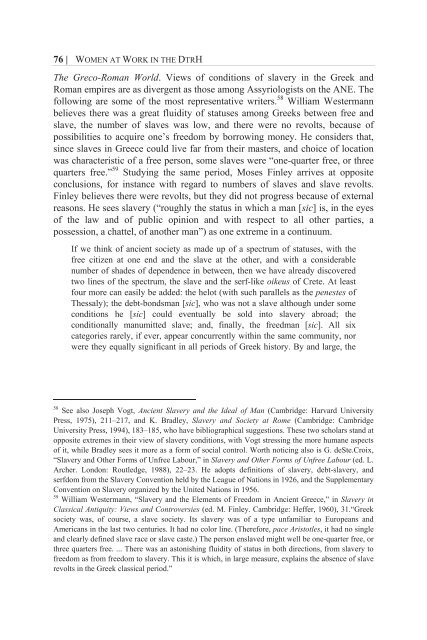Women at Work in the Deuteronomistic History - International Voices ...
Women at Work in the Deuteronomistic History - International Voices ...
Women at Work in the Deuteronomistic History - International Voices ...
You also want an ePaper? Increase the reach of your titles
YUMPU automatically turns print PDFs into web optimized ePapers that Google loves.
76 | WOMEN AT WORK IN THE DTRH<br />
The Greco-Roman World. Views of conditions of slavery <strong>in</strong> <strong>the</strong> Greek and<br />
Roman empires are as divergent as those among Assyriologists on <strong>the</strong> ANE. The<br />
follow<strong>in</strong>g are some of <strong>the</strong> most represent<strong>at</strong>ive writers. 58 William Westermann<br />
believes <strong>the</strong>re was a gre<strong>at</strong> fluidity of st<strong>at</strong>uses among Greeks between free and<br />
slave, <strong>the</strong> number of slaves was low, and <strong>the</strong>re were no revolts, because of<br />
possibilities to acquire one’s freedom by borrow<strong>in</strong>g money. He considers th<strong>at</strong>,<br />
s<strong>in</strong>ce slaves <strong>in</strong> Greece could live far from <strong>the</strong>ir masters, and choice of loc<strong>at</strong>ion<br />
was characteristic of a free person, some slaves were “one-quarter free, or three<br />
quarters free.” 59 Study<strong>in</strong>g <strong>the</strong> same period, Moses F<strong>in</strong>ley arrives <strong>at</strong> opposite<br />
conclusions, for <strong>in</strong>stance with regard to numbers of slaves and slave revolts.<br />
F<strong>in</strong>ley believes <strong>the</strong>re were revolts, but <strong>the</strong>y did not progress because of external<br />
reasons. He sees slavery (“roughly <strong>the</strong> st<strong>at</strong>us <strong>in</strong> which a man [sic] is, <strong>in</strong> <strong>the</strong> eyes<br />
of <strong>the</strong> law and of public op<strong>in</strong>ion and with respect to all o<strong>the</strong>r parties, a<br />
possession, a ch<strong>at</strong>tel, of ano<strong>the</strong>r man”) as one extreme <strong>in</strong> a cont<strong>in</strong>uum.<br />
If we th<strong>in</strong>k of ancient society as made up of a spectrum of st<strong>at</strong>uses, with <strong>the</strong><br />
free citizen <strong>at</strong> one end and <strong>the</strong> slave <strong>at</strong> <strong>the</strong> o<strong>the</strong>r, and with a considerable<br />
number of shades of dependence <strong>in</strong> between, <strong>the</strong>n we have already discovered<br />
two l<strong>in</strong>es of <strong>the</strong> spectrum, <strong>the</strong> slave and <strong>the</strong> serf-like oikeus of Crete. At least<br />
four more can easily be added: <strong>the</strong> helot (with such parallels as <strong>the</strong> penestes of<br />
Thessaly); <strong>the</strong> debt-bondsman [sic], who was not a slave although under some<br />
conditions he [sic] could eventually be sold <strong>in</strong>to slavery abroad; <strong>the</strong><br />
conditionally manumitted slave; and, f<strong>in</strong>ally, <strong>the</strong> freedman [sic]. All six<br />
c<strong>at</strong>egories rarely, if ever, appear concurrently with<strong>in</strong> <strong>the</strong> same community, nor<br />
were <strong>the</strong>y equally significant <strong>in</strong> all periods of Greek history. By and large, <strong>the</strong><br />
58 See also Joseph Vogt, Ancient Slavery and <strong>the</strong> Ideal of Man (Cambridge: Harvard University<br />
Press, 1975), 211–217, and K. Bradley, Slavery and Society <strong>at</strong> Rome (Cambridge: Cambridge<br />
University Press, 1994), 183–185, who have bibliographical suggestions. These two scholars stand <strong>at</strong><br />
opposite extremes <strong>in</strong> <strong>the</strong>ir view of slavery conditions, with Vogt stress<strong>in</strong>g <strong>the</strong> more humane aspects<br />
of it, while Bradley sees it more as a form of social control. Worth notic<strong>in</strong>g also is G. deSte.Croix,<br />
“Slavery and O<strong>the</strong>r Forms of Unfree Labour,” <strong>in</strong> Slavery and O<strong>the</strong>r Forms of Unfree Labour (ed. L.<br />
Archer. London: Routledge, 1988), 22–23. He adopts def<strong>in</strong>itions of slavery, debt-slavery, and<br />
serfdom from <strong>the</strong> Slavery Convention held by <strong>the</strong> League of N<strong>at</strong>ions <strong>in</strong> 1926, and <strong>the</strong> Supplementary<br />
Convention on Slavery organized by <strong>the</strong> United N<strong>at</strong>ions <strong>in</strong> 1956.<br />
59 William Westermann, “Slavery and <strong>the</strong> Elements of Freedom <strong>in</strong> Ancient Greece,” <strong>in</strong> Slavery <strong>in</strong><br />
Classical Antiquity: Views and Controversies (ed. M. F<strong>in</strong>ley. Cambridge: Heffer, 1960), 31.“Greek<br />
society was, of course, a slave society. Its slavery was of a type unfamiliar to Europeans and<br />
Americans <strong>in</strong> <strong>the</strong> last two centuries. It had no color l<strong>in</strong>e. (Therefore, pace Aristotles, it had no s<strong>in</strong>gle<br />
and clearly def<strong>in</strong>ed slave race or slave caste.) The person enslaved might well be one-quarter free, or<br />
three quarters free. ... There was an astonish<strong>in</strong>g fluidity of st<strong>at</strong>us <strong>in</strong> both directions, from slavery to<br />
freedom as from freedom to slavery. This it is which, <strong>in</strong> large measure, expla<strong>in</strong>s <strong>the</strong> absence of slave<br />
revolts <strong>in</strong> <strong>the</strong> Greek classical period.”




